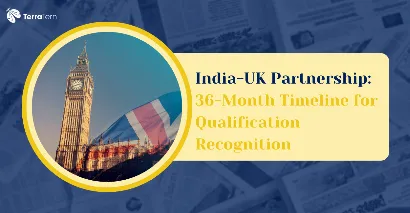Key Highlights
- Key Professions Included in Recognition Framework
- Understanding Mutual Recognition Agreements
- Enhanced Mobility Provisions Under CETA
- Current Indian Professional Workforce in UK
- Implementation Timeline and Process
- Economic Impact and Trade Benefits
- Building on Previous Educational Agreements
- No Commitments on Banking Sector
- Conclusion
India and the UK have reached a bilateral agreement to negotiate reciprocal recognition agreements (MRAs) within 36 months, and this will be of great significance to the professional movement between both countries. This is one of the developments under the India-UK Comprehensive Economic and Trade Agreement (CETA), signed on 24 July 2025.
Key Professions Included in Recognition Framework
One of the commerce ministry officials affirmed It has been agreed that the two countries will be involved in an agreement of mutual recognition of qualifications since in some professional services mutual recognition of qualifications is a requisite, such as for nurses, architects, accountants, and dentists. In the next 36 months, we shall attempt to sign MRAs with the UK". The MRAs will be used in key professional fields on which qualification recognition is vital to cross-border freedom of movement:
-
Nursing Professional: meeting workforce in healthcare
-
Architects: Serving the construction and urban developing concerns
-
Accountants: They are helping in the integration of financial services
-
Dentists: Increasing the provision of health care services
Also Read: UK Study Visa Requirements, Process, Benefits
Understanding Mutual Recognition Agreements
MRAs in professional services are optional agreements among competent authorities of the respective countries. Such arrangements grant the legal appreciation of some licensing or qualification needs acquired in the jurisdiction of additional countries. The realization includes a number of factors, such as
-
Degrees and Education credentials
-
Training certifications
-
Professional certifications needs
-
Accreditation standards
-
Professional experience validation
Enhanced Mobility Provisions Under CETA
The trade agreement provides an assured mobility regime for multiple categories of Indian professionals:
|
Professional Category |
Stay Duration |
Additional Benefits |
|
Business Visitors |
90 days within 6 months |
All sectors covered |
|
Intra-corporate Transferees |
Up to 3 years |
Includes spouses and dependents |
|
Graduate Trainees |
Up to 3 years |
Similar to transferee benefits |
|
Investors |
1 year |
Dedicated visa category |
|
Contractual Service Suppliers |
12 months within 24 months |
Covers 33 sub-sectors |
|
Independent Professionals |
12 months within 24 months |
Covers 16 sub-sectors |
Current Indian Professional Workforce in UK
There are about 60, 000 Indian intra-corporate transferees employed in the UK , especially in the IT industry. The UK has promised to avail workers as well as their respective partners and dependents of the three-year visa. Of most importance is the fact that Britain has accepted to have it so that no numerical restrictions would be presented to workers.
Read More: UK Visitor Visa: Complete Application and Guidelines
Implementation Timeline and Process
The trade agreement between India and the UK has to be approved by the British parliament, which would probably take one year to complete in totality. After this endorsement, the 36-month section of MRA discussions will start, and the adherence of professional qualifications may be launched by the year 2028.
|
Timeline |
Milestone |
|
July 2025 |
Trade agreement signed |
|
Mid-2026 |
Expected parliamentary approval |
|
2028-2029 |
Target completion of MRAs |
Economic Impact and Trade Benefits
India maintains a trade surplus of approximately $6.6 billion with the UK. India has provided market access to the UK in professional, financial (including insurance), environmental, and other services. The UK's expertise in these areas is expected to lead to increased investments in India.
The enhanced professional mobility is expected to boost this further by:
-
Increasing service exports from India
-
Facilitating investment flows between countries
-
Creating new opportunities in professional services sectors
Building on Previous Educational Agreements
This professional qualification recognition is an addition to the already existing educational effort of cooperation. India and the UK have signed a mutual recognition agreement concerning the academic qualification of all types; A-levels, undergraduate degree, and postgraduate degrees. Under this prior agreement it already makes possible:
-
Recognition of Indian upper secondary when entering UK universities
-
Recognition of UK master's degrees in India
-
Freedom of movement of students in UK
Also Read: Youth Mobility Visa UK
No Commitments on Banking Sector
It was explained by the officials that India has not entered into any understanding with the UK on having caps on British banks being eased in the expansion of branches. This is a strategic decision that will guarantee:
-
Retention of Policy Autonomy: India does not give up its powers of banking regulations.
-
Financial Independence Safeguarded: No foreign lobby to change the existing banking limits or curbs.
-
Selective Market Opening: Professional services opened and sensitive financial sectors left guarded.
-
Strategic Balance Preserved: ST leaves room in other areas without injuring the banking oversight.
-
Flexibility of Regulations Maintained: India has the freedom to make changes to banking policies depending on the domestic economy's demands.
Conclusion
The India UK professional qualification recognition initiative represents a transformative step toward creating a globally mobile workforce. With the 36-month implementation timeline now in place, professionals in nursing, architecture, accounting, and dentistry can prepare for enhanced career opportunities across both nations. This historic agreement builds upon the existing educational qualification recognition framework signed in 2022 and complements the enhanced mobility provisions under CETA, creating a comprehensive pathway for professional development. To know more about India-UK partnership news, visit TerraTern now!








